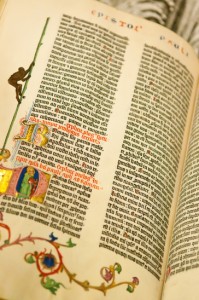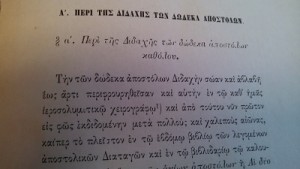 In our last post we looked at a fascinating collection of books written in the period of time just after the death of the apostles: The Apostolic Fathers. These books were not included in the canon for a variety of reasons, mostly because they were not apostolic in origin. They are still fascinating to consider: they highlight the difference between scripture and the valuable (but not authoritative) writings of church history. These books show remarkable reverence for the words of the canonical scriptures, and so serve as an important witness to the early recognition of the canon as we’ve come to receive it. These books also make some great devotional reading.
In our last post we looked at a fascinating collection of books written in the period of time just after the death of the apostles: The Apostolic Fathers. These books were not included in the canon for a variety of reasons, mostly because they were not apostolic in origin. They are still fascinating to consider: they highlight the difference between scripture and the valuable (but not authoritative) writings of church history. These books show remarkable reverence for the words of the canonical scriptures, and so serve as an important witness to the early recognition of the canon as we’ve come to receive it. These books also make some great devotional reading.
One of the most important books of the Apostolic Fathers is a short document known as the Didache (pronounced Dee-Dah-Kay). This is a Greek word meaning “Teaching.” The full name of the Didache would be The Teaching of the Twelve Apostles. It wasn’t really the teaching of the apostles per se, instead it is an attempt to summarize the core teaching of the faith in a simple way, along with some practical applications for worship. It is similar in this regard to The Apostles’ Creed. The apostles did not actually write the creed, but it does reflect in a helpful summary form the core teaching of the apostles. Likewise, the Didache survives as an early witness to a summation of the apostolic witness.
The history of the book is fascinating. The one surviving manuscript wasn’t discovered until 1873. But the book dates to early on in church history. The latest the book could have been written is the third century, but there is good reason to date the book between 50-110 AD. A reasonable date would be 70 AD. If true, that makes this book an early witness indeed, dating to a time when some of the apostles were still living. We’ll never know the date for sure.
In terms of content, the book divides neatly into two parts, both of interest. The first half is a summary of the Christian faith contrasted in two “ways.”
There are two ways, one of life and one of death, and great is the difference between the two! Now the way of life is this: first, “you shall love God who made you,” second, “your neighbor as yourself,” and “whatever you do not wish to happen to you, do not do to another….”
But the way of death is this: first of all, it is evil and completely cursed; murders, adulteries, robberies, lusts, fornications, thefts, idolatries, magic arts, sorceries, robberies, false testimonies,….
It is not difficult to recognize this “two way” teaching to be a summary of Jesus’ own teaching:
Matthew 7:12-14 12 So in everything, do to others what you would have them do to you, for this sums up the Law and the Prophets. 13 “Enter through the narrow gate. For wide is the gate and broad is the road that leads to destruction, and many enter through it. 14 But small is the gate and narrow the road that leads to life, and only a few find it.
The parallels are obvious: the Golden Rule paraphrased, the teaching regarding two roads, and the context of which road you’re walking being tied to ethical adherence to the Law of God. This is an excellent picture of the way the Didache (and the Fathers as a whole) treat scripture: with reverence, with respect, and with submission. The Didache offers no new teaching here at all, but rather provides a helpful summary of Christian teaching. Upon which path am I walking? The narrow path or the broad one? Toward life or toward my destruction? And, of course, the narrow path is Jesus himself who is the Way (John 14:6).
The second half of the Didache is very different, but is equally interesting. It is focused on some practical application of the faith in the worship life of the church. More particularly, the book lays out some instruction for worship and even some liturgy: formal prayers and formulae. The verbiage of Lord’s Prayer for worship is provided (using “debts” and “debtors”).
Particularly fascinating is what these texts say about the sacraments of baptism and the Lord’s Supper.
On Baptism:
Now concerning baptism, baptize as follows: after you have reviewed all these things, baptize “in the name of the Father and of the Son and of the Holy Spirit” in running water. But if you have no running water, then baptize in some other water; and if you are not able to baptize in cold water, then do so in warm.” But if you have neither, then pour water on the head three times “in the name of the Father and Son and Holy Spirit.”
This passage interests me for two reasons: First, there is a quotation from scripture – the words of Jesus in the Great Commission (Matt. 28:18-20). Second, the passage indicates a real lack of interest in the mode of baptism. The mode, or how, of baptism is a matter of indifference – whether immersion or sprinkling, running or standing, warm or cold – doesn’t matter. What matters is that it is a Trinitarian Christian baptism in keeping with the canonical command of Jesus.
On the Lord’s Supper:
…let no one eat or drink of your Eucharist except those who have been baptized into the name of the Lord, for the Lord has also spoken concerning this: “Do not give what is holy to dogs.”
Again, there is a quotation, and again the quotation is of Jesus and is from the gospel of Matthew (7:6). Clearly the early church was seeking to ground all of its activities in the clear teaching of scripture. Here too we see the relationship between the two sacramental signs. Baptism is to be received only once and stands as the initiatory sign into the community of faith. Communion (or Eucharist, or the Lord’s Supper, or whatever other name we give it) is a covenant renewal ceremony intended for believers alone. Unbelievers may be welcomed to worship, but The Lord’s Supper is only for the family of faith.
 We shouldn’t build any doctrine from a book like the Didache; we should build our doctrine and ground our practice in the witness of scripture. But, the Didache shows us that the first generations of Christians were doing exactly this themselves – seeking to ground all of their worship and activity in the apostolic witness of the canonical scriptures.
We shouldn’t build any doctrine from a book like the Didache; we should build our doctrine and ground our practice in the witness of scripture. But, the Didache shows us that the first generations of Christians were doing exactly this themselves – seeking to ground all of their worship and activity in the apostolic witness of the canonical scriptures.